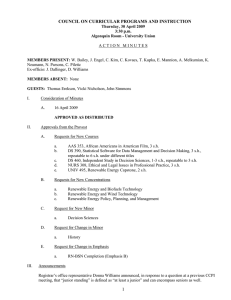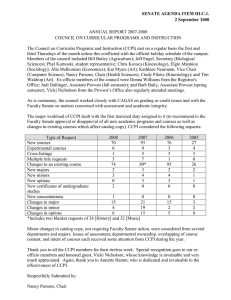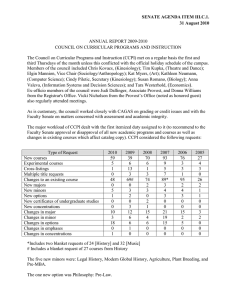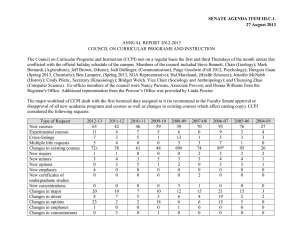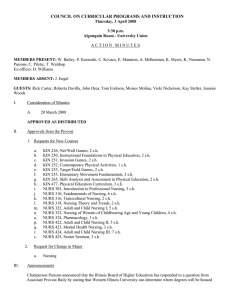COUNCIL ON CURRICULAR PROGRAMS AND INSTRUCTION
advertisement
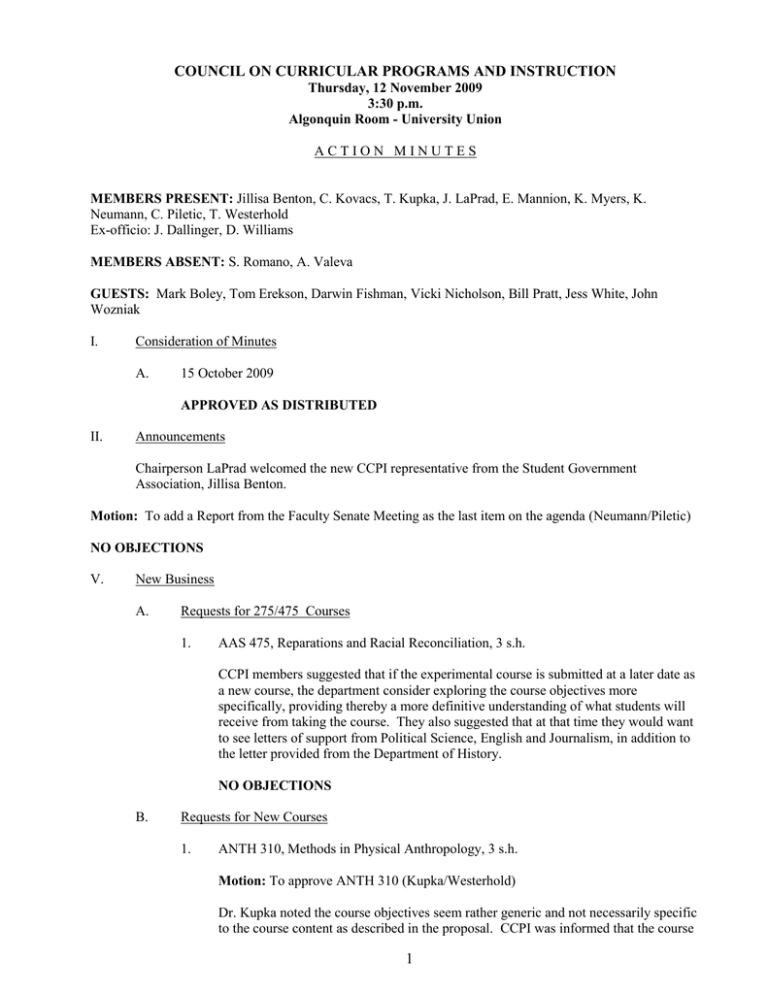
COUNCIL ON CURRICULAR PROGRAMS AND INSTRUCTION Thursday, 12 November 2009 3:30 p.m. Algonquin Room - University Union ACTION MINUTES MEMBERS PRESENT: Jillisa Benton, C. Kovacs, T. Kupka, J. LaPrad, E. Mannion, K. Myers, K. Neumann, C. Piletic, T. Westerhold Ex-officio: J. Dallinger, D. Williams MEMBERS ABSENT: S. Romano, A. Valeva GUESTS: Mark Boley, Tom Erekson, Darwin Fishman, Vicki Nicholson, Bill Pratt, Jess White, John Wozniak I. Consideration of Minutes A. 15 October 2009 APPROVED AS DISTRIBUTED II. Announcements Chairperson LaPrad welcomed the new CCPI representative from the Student Government Association, Jillisa Benton. Motion: To add a Report from the Faculty Senate Meeting as the last item on the agenda (Neumann/Piletic) NO OBJECTIONS V. New Business A. Requests for 275/475 Courses 1. AAS 475, Reparations and Racial Reconciliation, 3 s.h. CCPI members suggested that if the experimental course is submitted at a later date as a new course, the department consider exploring the course objectives more specifically, providing thereby a more definitive understanding of what students will receive from taking the course. They also suggested that at that time they would want to see letters of support from Political Science, English and Journalism, in addition to the letter provided from the Department of History. NO OBJECTIONS B. Requests for New Courses 1. ANTH 310, Methods in Physical Anthropology, 3 s.h. Motion: To approve ANTH 310 (Kupka/Westerhold) Dr. Kupka noted the course objectives seem rather generic and not necessarily specific to the course content as described in the proposal. CCPI was informed that the course 1 objectives underwent two edits by the department and currently reflect a recommendation made by the College Faculty Council to streamline them. Because ANTH 310 will be one of the methods courses that will be optional for students to take in the major, the department will be bringing forward a change in major form at a later date. Sociology and Anthropology Professor Jess White explained the department is trying to develop more 200- and 300-level courses in order to lead students through a logical progression of courses. Change: Change date of first offering to Fall 2010. MOTION APPROVED WITH CHANGE 9 YES – 0 NO – 0 AB 2. ANTH 417, Primate Ecology, Behavior, and Evolution, 3 s.h. Motion: To approve ANTH 417 (Mannion/Kupka) Ms. Benton commended the department on a short but informative course description which she said is beneficial to students when deciding upon classes. Because the department currently does not intend to offer this course until Spring 2012, CCPI discussed the purpose of the request for date of first offering, whether it is primarily for use of the Registrar’s office to inform them when the course can be loaded into the system or whether the information is primarily used to inform Faculty Senate when students can first take the class. The decision was made to change the date of first offering to reflect when the course can be loaded onto the system by the Registrar’s office, which would also provide the department with the option of offering the course to students sooner if they choose. Change: Change date of first offering to Fall 2010. MOTION APPROVED WITH CHANGE 9 YES – 0 NO – 0- AB 3. ENGR 320, Mechanical Design, 3 s.h. Motion: To approve ENGR 320 (Piletic/Westerhold) School of Engineering Director Bill Pratt told CCPI the proposed new courses need to be taught in January 2010 in order to keep the first cadre of Engineering students from being held back. He explained the school is trying to graduate its first class two years from this fall in order to be eligible for accreditation. He said the program as it is currently structured does not conform to generally accepted business practices; an attempt is being made to offer additional courses and reorganize the program more logically in order to make it easier for students to complete their Engineering degree. College of Business and Technology Dean Tom Erekson explained that when he and former Engineering Technology Chair Tom Bridge developed the Engineering program a year ago, they followed Accreditation Board for Engineering Technology (ABET) guidelines for math, science, and engineering courses but didn’t look at the overall scaffolding of the program. He said now that a Director of the School of Engineering has been hired, it is important that the program include the correct math and science prerequisites to fill those gaps. Dean Erekson told CCPI there needs to be at least one class of Engineering students graduate before ABET accreditation will be granted; then the accreditation is retroactive one year. 2 Ms. Nicholson asked if the school would be putting forward a change of major. Dr. Pratt responded this would be forthcoming but not until the beginning of spring semester. Ms. Williams pointed out that changes will not be reflected in the catalog for spring but will be available in the online catalog; Dr. Pratt responded that should be no problem as he does all of the advising for students. Ms. Nicholson reminded Dr. Pratt that students who began the program this year would be able to graduate under the requirements of the current catalog rather than the new requirements. Dr. Pratt stated there are only four students who would fall under the current catalog, and they all favor the proposed changes. He will move their catalog year up once the changes are approved. He noted that ENGR 320 includes some overlap with other Engineering courses such as material science, but said this is the way ABET wants programs to be structured. MOTION APPROVED 9 YES – 0 NO – 0 AB 4. ENGR 340, Manufacturing Engineering, 3 s.h. Motion: To approve ENGR 340 (Kovacs/Westerhold) Dr. Pratt explained the proposed course will provide students with the concepts they will need to understand all of Engineering. Dean Erekson explained the College has been delivering Manufacturing Engineering Technology on a three-year cycle but would like to transition to a two-year cycle; in order to do so, Engineering Technology students need to be able to take some of the Engineering courses, which explains why ENGR 340 might seem to be a little “lighter” than some of the other offerings. Dr. Pratt elaborated that when ABET considers prereqs, they judge whether the correct prerequisites – the minimum requirements in order to be successful for the course – are in place and being enforced. He said in the case of ENGR 340, those correct prereqs would include math, English, and public speaking. CCPI pointed out that the prerequisites specified on the request form – “Junior standing or permission of the instructor” – do not necessarily achieve this goal. Because Engineering students would need MATH 133 and Engineering Technology students need MATH 137, the prerequisites for ENGR 340 were changed to “Junior standing and MATH 133, or MATH 137 and approval of the department.” Ms. Williams reminded Dr. Pratt that the Engineering Technology major will also need changed in order to allow this course to be taken by their students. Changes: Change prerequisites to “Junior standing and MATH 133, or MATH 137 and approval of the department.” Minor grammatical changes to course description. MOTION APPROVED WITH CHANGES 9 YES – 0 NO – 0 AB 5. ENGR 351, Engineering Material Science, 3 s.h. Motion: To approve ENGR 351 (Westerhold/Piletic) CCPI recommended that the department strike the statement in Relationship to Existing Courses within the Department that indicates that students must have completed math and science requirements, explaining that this statement is not necessary because it is encompassed within the ENGR 251 prerequisite. 3 Change: Within the Relationship to Existing Courses within the Department section, change sentence to read, “Students must have completed all math and science requirements and mechanics of materials course.” MOTION APPROVED WITH CHANGE 9 YES – 0 NO – 0 AB 6. ENGR 370, Micro-electronics I, Circuit Analysis and Design, 3 s.h. Motion: To approve ENGR 370 (Kovacs/Westerhold) Physics Department Interim Chair Mark Boley told CCPI there is quite a bit of overlap between ENGR 370 and his department’s electronics course. He said his department is not opposing the Engineering course, explaining that Engineering needs the course because they have a number of topics included that are not covered in the Physics course. He said Physics does believe ENGR 370 includes a lot of material to cover in one semester, but the department supports its creation. Change: Because of the length of the course description, delete the last sentence: “Use of modern design and analysis software is incorporated in the instruction.” MOTION APPROVED WITH CHANGE 9 YES – 0 NO – 0 AB 7. SOC 334, Contemporary Sociological Theory, 3 s.h. Motion: To approve SOC 334 (Kupka/Romano) Sociology and Anthropology Chair John Wozniak explained that most other departments of Sociology offer a similar course, and Western has been behind in offering this type of theory class. He stated that with this course, students will gain knowledge of everything that has been developed in current sociological theory. Change: Change date of first course offering to Fall 2010. MOTION APPROVED WITH CHANGE 9 YES – 0 NO – 0 AB C. Request for Change in Prerequisites 1. PHY 430, Introductory Quantum Mechanics I, 3 s.h. Current: PHY 201 Proposed: PHY 201 and MATH 333 Motion: To approve PHY 430 (Kovacs/Mannion) Dr. Neumann asked if MATH 333 will be offered frequently enough for the Physics Department’s needs. Dr. Boley responded MATH 333 is offered every semester, and Physics students usually take it the second semester of their sophomore year. He added that other upper-level Physics courses at WIU have this prerequisite, so the department wanted to make it standard. MOTION APPROVED 9 YES – 0 NO – 0 AB D. Request for Change in Prerequisites and Course Number 1. ENGR 311, Fluid Dynamics, 3 s.h. Current: ENGR 311 4 Prereq: ENGR 211 Proposed: ENGR 310 Prereq: PHY 354 Motion: To approve ENGR 311 (Mannion/Kovacs) MOTION APPROVED 9 YES – 0 NO – 0 AB E. Request for Change in Major 1. Sociology Motion: To approve Sociology major (Piletic/Westerhold) Changes: Change Gen Ed hours to 60. Change existing Open Electives to 7-11 s.h. and proposed Open Electives to 4-8 s.h. MOTION APPROVED WITH CHANGES 9 YES – 0 NO – 0 AB IV. Reports A. Provost’s Report – None B. Report from Faculty Senate Meeting Chairperson LaPrad recapped that CCPI believed its concerns about pre-law options were bigger than the purview of the council so has asked Faculty Senate for their guidance. Chairperson LaPrad prepared a summary of those concerns and submitted it to the Senate Executive Committee; it will subsequently be discussed before the full Senate at the last meeting of the semester. Chairperson LaPrad informed CCPI that after their October 12 meeting, Philosophy and Religious Studies asked Faculty Senate to consider the question of using “ors” within cores. Faculty Senate has spent their last two meetings discussing at length the definition of options and cores. Chairperson LaPrad stated that at their first meeting, Faculty Senate recommended a change to the definition of an option that would replace “required courses” with “requirements”; the sentence would read, “Includes a set of unique required courses requirements in addition to those specific courses required for the major field of study.” He told CCPI that when this recommendation was submitted by Faculty Senate to President Goldfarb for approval, the President asked for further clarification. Chairperson LaPrad pointed out that the change recommended by Faculty Senate did not affect the core requirements for options, which was at the heart of the concerns expressed by Philosophy/Religious Studies and English/Journalism. He said that a motion to send clarification of the core hours and definition back to CCPI for language recommendation and review was defeated by senators. A special Senate meeting has now been scheduled for November 17 with a motion on the floor from the Executive Committee to define core requirements in terms of size of the majors. Dr. Neumann, who attended the Senate meetings along with Dr. Mannion, said she believes the point is well taken that CCPI, when recommending the definitions of academic terms, did not make allowance for majors with more hours versus comprehensive majors; she pointed out that for majors with 32 hours, a 15-hour core requirement is nearly half of the entire major, while for 66-hour majors a 15hour core is not very large at all. She stated what the Executive Committee has proposed is a 5 sliding scale in order to accommodate smaller majors and to allow “ors” within a core by grouping them as “learning outcomes.” Chairperson LaPrad asserted that the Executive Committee motion, if approved, would help CCPI when those majors that were previously grandfathered in with smaller cores come forward with changes to their options. He pointed out that when departments create options, they are creating “fields of study” but do not have to submit feasibility studies to justify their creation. Motion: To adjourn (Mannion) The Council adjourned at 5:12 p.m. Cindy Piletic, Secretary Annette Hamm, Faculty Senate Recording Secretary 6
